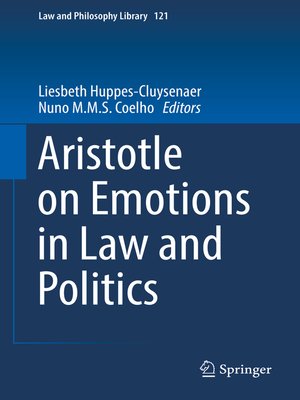Aristotle on Emotions in Law and Politics
ebook ∣ Law and Philosophy Library
By Liesbeth Huppes-Cluysenaer

Sign up to save your library
With an OverDrive account, you can save your favorite libraries for at-a-glance information about availability. Find out more about OverDrive accounts.
Find this title in Libby, the library reading app by OverDrive.



Search for a digital library with this title
Title found at these libraries:
| Library Name | Distance |
|---|---|
| Loading... |
In this book, experts from the fields of law and philosophy explore the works of Aristotle to illuminate the much-debated and fascinating relationship between emotions and justice. Emotions matter in connection with democracy and equity – they are relevant to the judicial enforcement of rights, legal argumentation, and decision-making processes in legislative bodies and courts. The decisive role that emotions, feelings and passions play in these processes cannot be ignored – not even by those who believe that emotions have no legitimate place in the public sphere.
A growing body of literature on these topics recognizes the seminal insights contributed by Aristotle. This book offers a comprehensive analysis of his thinking in this context, as well as proposals for inspiring dialogues between his works and those written by a selection of modern and contemporary thinkers. As such, the book offers a valuable resource for students of law, philosophy, rhetoric, politics, ethics and history, but also for readers interested in the ongoing debate about legal positivism and the relevance of emotions for legal and political life in today's world.
A growing body of literature on these topics recognizes the seminal insights contributed by Aristotle. This book offers a comprehensive analysis of his thinking in this context, as well as proposals for inspiring dialogues between his works and those written by a selection of modern and contemporary thinkers. As such, the book offers a valuable resource for students of law, philosophy, rhetoric, politics, ethics and history, but also for readers interested in the ongoing debate about legal positivism and the relevance of emotions for legal and political life in today's world.







